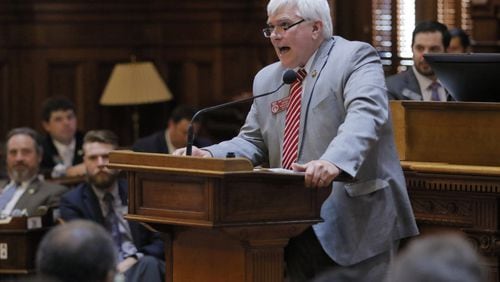Jay Powell was reminded Friday night of the danger in leaving legislation to chance.
The chairman of the state House Ways and Means Committee and his friends spent the dinner break of Crossover Day in the General Assembly persuading colleagues who had just voted against him to change their minds.
The Camilla Republican was apparently quite successful, because hours after his bill to require ride-sharing companies Uber and Lyft to pay state sales tax lost a vote in the House, 28 lawmakers had a change of heart.
At 5:06 p.m. House Bill 225 failed by an 88-82 vote. It takes 91 votes in the House to pass a bill. Powell was able to use a procedural move to breathe new life into the bill and have it sent back to the Rules Committee, meaning it could be called back to the floor at any time.
“Any time” turned out to be 8:50 p.m. that same night when HB 225 was again called up for a vote in the House and this time passed 106-60.
In all, 45 House members changed their votes one way or another. Twenty-eight of those flipped from “No” to “yes.” Another six originally voted against the bill and then were not in the chamber when the second vote occurred.
Powell said he did not see the first vote coming.
“When the vote came in and I only had 82 votes, I was sort of stunned,” he said. “Usually, when people have a problem with your bill they will see you in advance so you can try and explain it to them. I was pretty much stunned.”
It turns out that not everyone understood HB 225. Powell’s measure would require Uber and Lyft and other ride-sharing companies to pay the same transportation sales tax that taxi and limousine companies already pay. Some lawmakers, however, mistakenly believed the bill was a brand new tax -- that is, a tax increase.
Rep. Dexter Sharper, R-Valdosta, was among those who went from against to in favor.
“I had a more in-depth conversation (with Powell) after the first vote,” Sharper said. “Making sure we’re just trying to be fair with everybody.”
Rep. Scott Hilton, R-Peachtree Corners, had much the same experience.
“Chairman Powell did a much better job explaining it the second time,” Hilton said. “My interpretation was it would be a new tax implemented on Uber. What we’re really paid down here to do is study, learn, research and talk to people. I was able to do a lot of that in the two hour three hours (between votes).”
Powell said within minutes of the first vote, several members of his committee offered to help talk to those who voted against it. He himself spoke with a few.
He said the experience reminded him that even as a nearly 10-year veteran of the House and chairman of one of the most powerful committees in the Capitol, you still have to do the leg work.
“I’ve been humbled, because I took it for granted and didn’t work it like I should,” Powell said.
About the Author







